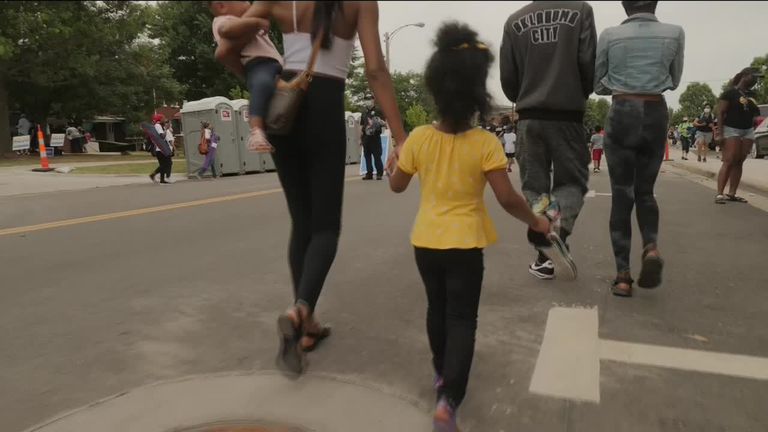Donald Trump: Tulsa prepares for election rally while marking Juneteenth
Coronavirus and a painful history of race relations have left many Tulsa residents wary of Trump's visit.
Saturday 20 June 2020 08:07, UK
Donald Trump will mark the resumption of his election campaign with a huge and controversial gathering in Tulsa, Oklahoma, tonight.
The American president suspended his early campaign rallies for the November election in April because of the coronavirus outbreak.
But tweeting about tonight's rally, he said: "Big crowds and lines already forming in Tulsa. My campaign hasn't started yet. It starts on Saturday night in Oklahoma!"
The location of the rally and its timing present dual controversies.
The state of Oklahoma and the city of Tulsa are still experiencing a daily upward trend of coronavirus cases.
While some parts of the world are experiencing a second COVID-19 spike, much of America is still ascending the first curve, prompting many to question the safety of a mass gathering even if social distancing and masks are encouraged.
According to a database of health authority figures complied by The New York Times, there have been at least 9,706 cases of coronavirus in Oklahoma. As of Friday evening, at least 367 people had died.
Despite the upward trend, the state's governor, Republican Kevin Stitt has said that Oklahoma is "one of the first states that has safely and measurably reopened".
"Oklahoma is ready for your visit," the governor told President Trump at a White House meeting on Thursday. "It's going to be safe and everyone's really really excited."
:: Listen to Divided States on , , , and
The city's BOK stadium has a capacity of 19,000. Organisers have said that 10,000 people will be permitted to enter. A temperature check will be made on entry. Sanitiser will be on offer as will masks, but they will not be compulsory.
Many thousands more are expected to gather outside where they have been queueing since Wednesday.
In the line some sported Trump merchandise from head to toe: "Four More Years" baseball caps, "Make America Great Again" T-shirts and "Fake News, Enemy of the People" banners.
Several blocks away, a contrasting America was on display. In the Greenwood district of the city, this weekend began with the marking of Juneteenth - the day the last slaves in America realised they were free.
It was insulting for many here that the American president chose to coincide his rally with this anniversary.
And it was an insult compounded when he claimed that "no one has ever heard of Juneteenth".
"Juneteenth means everything to me. Juneteenth is the place where black people can come and we can discuss and we can share," local Vickey Scott told me.
In Tulsa though, there is an added poignancy for the black community because of another event that many people really haven't heard of - the Tulsa Massacre.
In May 1921, the Greenwood district of Tulsa was booming. Known as Black Wall Street, it was a place where African Americans who had fled slavery in the Deep South had made successful lives.
But after an incident in which a 19-year-old black boy was accused of assaulting a 17-year-old white girl, a riot turned into a massacre with a mob of white men murdering as many as 300 African Americans.
It is America's worst single incident of racial violence and yet until recently it had been almost entirely airbrushed from history books.
Much of the district was destroyed and the survivors sent to internment camps on the city's edge.
"At least 300 died," Kavin Ross told me. His grandfather was among thousands whose businesses were destroyed in the massacre.
"I have no problem with the president coming here. It's just the attraction that he brings. He rallies, he dog whistles his base who are saying 'white power' and 'white lives matter' and 'build that wall', all that racist rhetoric. We don't need that here in Tulsa. We're just trying to heal," Mr Ross said.
All these years on, the racial divide in Tulsa is still clear, so clear that locals say it is marked by the railway line which cuts across the city from west to east.
To this day, north Tulsa, dominated by the Greenwood district where the massacre happened, is the black neighbourhood. To the south it's white.
The street names in Greenwood reflect the struggles with Reconciliation Way and Martin Luther King Jnr Boulevard, a new name, unveiled in 2011.
But at the point where the road crosses the railway, Martin Luther King Jnr Boulevard ends. Agreement couldn't be reached with the predominantly white council to extend the street name south of the railway line.








